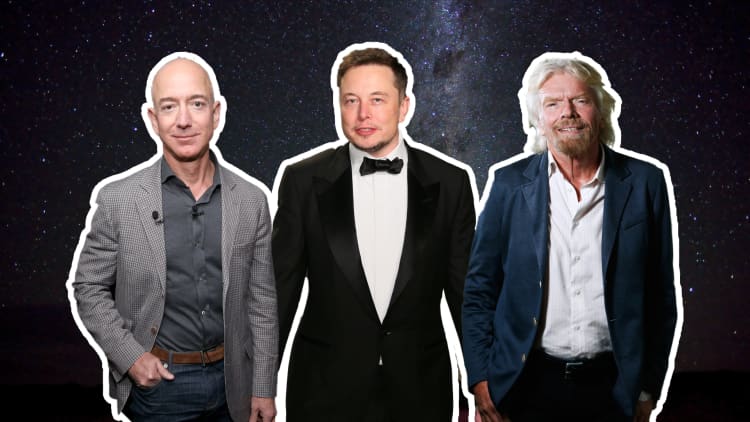As the richest man in the world, Amazon boss Jeff Bezos doesn't have to play it safe.
Bezos proved that Thursday when he published a post on Medium titled "No thank you, Mr. Pecker," referring to David Pecker, the chairman and CEO of American Media Inc., which publishes the National Enquirer tabloid.
In the post, Bezos claims AMI bigwigs threatened to publish intimate photos of him — including a "below the belt selfie" — unless Bezos called off a private investigation into AMI that he'd funded after the Enquirer released private texts between Bezos and his girlfriend, Lauren Sanchez.
"Of course I don't want personal photos published," Bezos writes on Medium, "but I also won't participate in their well-known practice of blackmail, political favors, political attacks, and corruption.
"I prefer to stand up, roll this log over, and see what crawls out."
AMI told CNBC in a statement that what Bezos called blackmail were "in good faith negotiations to resolve all matters with him," but "in light of the nature of the allegations published by Mr. Bezos, the Board has convened and determined that it should promptly and thoroughly investigate the claims."
But Bezos' stance is not suprising; it's just the latest maneuver in a career characterized by bold moves, since long before he was worth $130.5 billion. While disrupting retail, Bezos has never been afraid to push boundaries with new products, take risks in new markets or prove wrong those who doubt him.
Here are four of the boldest business moves Jeff Bezos has made.
Quitting a great job to start an online book store in 1994
When Bezos decided to launch Amazon, he left a stable job for what was, at the time, a significant unknown.
In the early '90s, "I was working at a financial firm in New York City with a bunch of very smart people, and I had a brilliant boss that I much admired," Bezos said in a 2010 Princeton commencement speech. "I went to my boss and told him I wanted to start a company selling books on the Internet."
At the time, the internet was still new, so Bezos' boss was not convinced.
"He took me on a long walk in Central Park, listened carefully to me, and finally said, 'That sounds like a really good idea, but it would be an even better idea for someone who didn't already have a good job,'" recalled Bezos. "That logic made some sense to me, and he convinced me to think about it for 48 hours before making a final decision.
"Seen in that light, it really was a difficult choice, but ultimately, I decided I had to give it a shot," he said. "I didn't think I'd regret trying and failing. And I suspected I would always be haunted by a decision to not try at all. After much consideration, I took the less safe path to follow my passion, and I'm proud of that choice."
Launching Amazon Prime in 2005
When Amazon launched Prime during an earnings call in 2005, skeptics were unconvinced customers would be willing to pay the then $79-a-year fee, and if they actually did buy into the program, some wondered how Amazon would pay for the resulting operational costs, according to The Washington Post.
"Prime initially found many skeptics, and we were obviously watching closely to see how members responded," Greg Greeley, the then vice president of Amazon Prime Global, told the Post.
Bezos and his team were steely, however. "We never thought it wasn't going to work. This was one experiment we knew we were going to make work — failure was not an option," Greeley said.
Renventing the 'book'
On Nov. 19, 2007, Amazon launched the first Kindle.
Though it was not the first e-reader to the market — Sony launched an e-book in 2004 — it certainly helped launch the trend.
"My first day at Amazon was the day the Kindle launched — November 19, 2007. I walked into the office and everyone was going crazy. I thought that's what it was going to be like every day," Chris Green, a vice president of design at its Amazon's hardware research and development company Lab126, told Techcrunch in 2017. "Then the next morning I went in, they had sold all the Kindles in one day."
Buying Whole Foods
In June 2017, Amazon announced it was buying Whole Foods, in a deal valued at $13.7 billion.
The tie-up turned heads.
"This is an earthquake rattling through the grocery sector as well as the retail world," Mark Hamrick, senior economic analyst at Bankrate.com, told CNBC at the time. "We can only imagine the technological innovation that Amazon will bring to the purchasing experience for the consumer. Now, we can see in hindsight that its recent dithering around the brick-and-mortar experience, as an experiment, was only a rumbling of the seismic event in the offing."
At the time, tech site Recode called the acquisition a "power move for Amazon into the groceries and brick-and-mortar retail industries."
Since then, Amazon has signaled it will enter the prescription medicine space with its acquisition of PillPack and turned up the heat on companies like FedEx with its new last-mile delivery service Delivery Service Partners program.
Bezos is a maverick: Standing up to AMI was not Bezos' first audacious move, and it likely won't be his last.
See also:
Jeff Bezos: You can't pick your passions
Jeff Bezos says this is how he plans to spend the bulk of his fortune

Like this story? Subscribe to CNBC Make It on YouTube!


